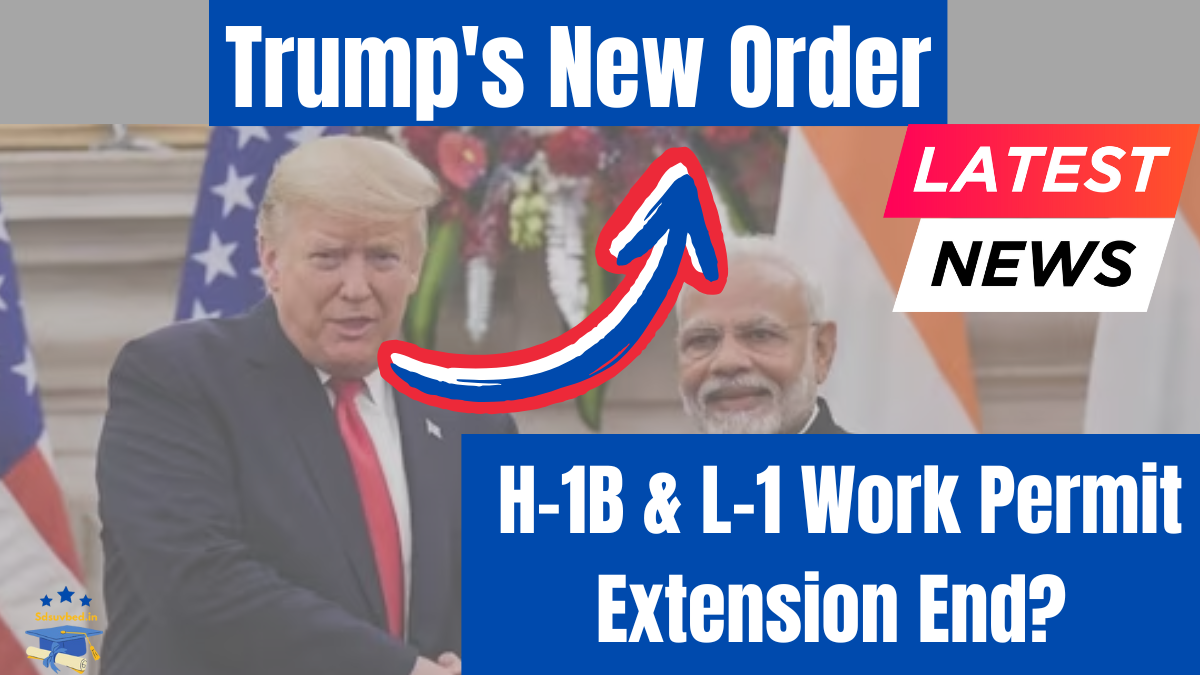The Biden administration introduced a rule extending automatic work permit renewals from 180 days to 540 days for H-1B, L-1, and other visa holders. However, Republican Senators John Kennedy and Rick Scott have introduced a resolution to roll back this extension, arguing that it weakens US immigration policies.
With Donald Trump likely to revoke this rule, thousands of Indian professionals and foreign workers may face job uncertainty due to delays in work permit renewals.

Why is the H-1B & L-1 Work Permit Extension Under Scrutiny?
Republicans argue that the 540-day auto-renewal rule:
- Allows foreign workers to stay longer in the US without new approvals.
- Reduces oversight of individuals working on expired visas.
- Undermines efforts to strengthen border security and immigration laws.
Senator Kennedy stated, “The Biden administration’s dangerous rule automatically extended work permits for immigrants to 540 days. This hampers Trump’s efforts to enforce immigration laws and keep Americans safe.”
What Are the H-1B, H-4, L-1, and L-2 Visas?
To understand the impact of this rule change, it’s essential to review the visa categories affected:
| Visa Type | Purpose | Who Qualifies? | Maximum Stay |
|---|---|---|---|
| H-1B Visa | Allows US companies to hire foreign professionals in specialized fields (tech, finance, engineering) | Foreign professionals with at least a bachelor’s degree | 6 years (with extensions possible) |
| H-4 Visa | Dependent visa for H-1B holders’ spouses and children | Unmarried children under 21 and spouses of H-1B workers | Tied to H-1B holder’s validity |
| L-1 Visa | Enables multinational companies to transfer employees to US offices | Executives, managers, or employees with specialized knowledge | L-1A: 7 years, L-1B: 5 years |
| L-2 Visa | Dependent visa for L-1 holders’ spouses and children | Unmarried children under 21 and spouses of L-1 visa holders | Tied to L-1 holder’s validity |
How Have Indian Workers Benefited from the Rule?
The 540-day work permit extension has significantly benefited Indian nationals, who hold a majority of H-1B and L-1 visas.
- 72% of all H-1B visas in 2023 were issued to Indian professionals.
- 76,671 L-1 visas and 83,277 L-2 visas were granted in 2023, with Indians dominating these categories.
- A large number of Indian H-4 visa holders also benefited from the auto-renewal policy.
If the 540-day extension is revoked, thousands of Indian workers may face:
- Work permit expirations, forcing them to leave their jobs.
- Delays in USCIS processing, leading to employment gaps.
- Increased uncertainty for dependents on H-4 and L-2 visas.
MUST READ: 208 Million Dogecoin (DOGE) Shocks Coinbase: Whale Moves $64M in Crypto
What Happens Next?
The Republican resolution to reverse the 540-day extension will go through Congress under the Congressional Review Act (CRA). If successful, the work permit renewal period will revert to 180 days.
Potential Outcomes:
✔ If the rule is revoked – Foreign workers will have a shorter renewal window, increasing processing delays.
✔ If the rule remains – H-1B, L-1, and dependent visa holders will continue to benefit from 540-day extensions.
FAQs
Will Trump revoke the 540-day work permit renewal?
If Trump returns to office, he may reverse Biden’s rule, bringing the renewal period back to 180 days.
How does this impact Indian H-1B visa holders?
Indian professionals, who hold 72% of H-1B visas, may face renewal delays and potential job disruptions.
What happens if my work permit renewal takes longer than 180 days?
If the rule is revoked, workers may lose employment if their renewal isn’t processed within six months.
How can H-4 and L-2 visa holders be affected?
Many H-4 and L-2 spouses work under employment authorizations, which rely on timely renewals. A 180-day renewal period may cause job losses.
What should visa holders do to prepare?
Stay updated with USCIS processing times, apply for renewals early, and explore alternative visa options.
Can the 540-day extension be restored in the future?
If Congress overturns the Republican resolution, the rule may stay in place, but further policy changes remain possible.
How does this affect US employers?
Tech firms and multinational corporations may struggle to retain talent if work authorizations expire before renewals.
Where can I check my work permit status?
Visit the USCIS website to track your work authorization renewal status.
Conclusion
With Trump and Republicans pushing to revoke the 540-day work permit extension, thousands of H-1B and L-1 visa holders, particularly Indian professionals, face renewal uncertainty. If the rule is reversed, visa holders will have only 180 days for renewal processing, increasing job risks and USCIS backlogs.
Foreign workers must stay informed about policy changes and prepare for possible delays to safeguard their employment status.
Click here to know more.
A passionate content writer specializing in creating engaging, SEO-optimized content. With expertise in blogs, web copy, and storytelling, I craft words that connect with audiences and deliver results.
